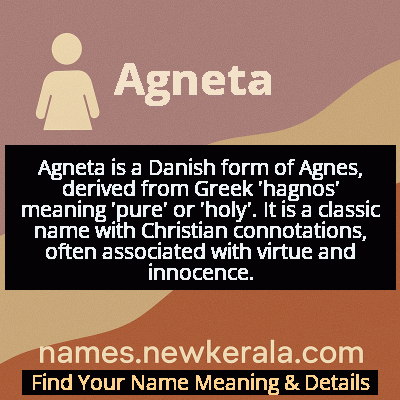Agneta Name Meaning & Details
Origin, Popularity, Numerology Analysis & Name Meaning of Agneta
Discover the origin, meaning, and cultural significance of the name AGNETA. Delve into its historical roots and explore the lasting impact it has had on communities and traditions.
Name
Agneta
Gender
Female
Origin
Danish
Lucky Number
3
Meaning of the Name - Agneta
Agneta is a Danish form of Agnes, derived from Greek 'hagnos' meaning 'pure' or 'holy'. It is a classic name with Christian connotations, often associated with virtue and innocence.
Agneta - Complete Numerology Analysis
Your Numerology Number
Based on Pythagorean Numerology System
Ruling Planet
Jupiter
Positive Nature
Optimistic, inspirational, and creative.
Negative Traits
Scattered, exaggerating.
Lucky Colours
Yellow, gold, purple.
Lucky Days
Thursday.
Lucky Stones
Yellow sapphire.
Harmony Numbers
1, 2, 9.
Best Suited Professions
Arts, writing, communication.
What People Like About You
Creativity, optimism.
Famous People Named Agneta
Agneta Fältskog
Singer-songwriter
Member of ABBA, sold over 150 million records worldwide
Agneta Pleijel
Author
Winner of multiple literary awards including the Aniara Prize
Agneta Andersson
Olympic Athlete
Won 3 gold, 4 silver, and 2 bronze Olympic medals in canoeing
Agneta Horn
Noblewoman/Writer
Authored one of the earliest known Swedish autobiographies
Name Variations & International Equivalents
Click on blue names to explore their detailed meanings. Gray names with will be available soon.
Cultural & Historical Significance
Extended Personality Analysis
Women named Agneta are typically characterized by their strong sense of integrity and quiet determination. They possess an inner compass that guides their decisions, often making them reliable and trustworthy individuals in both personal and professional settings. Their 'pure' namesake manifests not as naivete but as clarity of purpose and authenticity in their interactions. Agneta's tend to be observant and thoughtful, preferring to listen carefully before speaking, which gives them remarkable insight into people and situations. They often excel in careers that require precision, care, and attention to detail—such as healthcare, education, or creative arts. While they may appear reserved to strangers, those who earn their trust discover a warm, dry wit and deep emotional intelligence. Their Scandinavian roots often translate to a practical, no-nonsense approach to problem-solving and a strong appreciation for nature and simple pleasures. Agneta's typically value stability and tradition but are not inflexible—they adapt to change with quiet resilience. Many develop strong interests in preserving cultural traditions, environmental conservation, or community building, reflecting their deep connection to their heritage and values. Their strength lies in their consistency and the depth of their character rather than flashy displays of personality.
Modern Usage & Popularity
In contemporary naming trends, Agneta has transitioned from a popular choice to a classic, heritage name in Scandinavian countries. According to recent statistics from Denmark and Sweden, the name appears most frequently among women born between 1940 and 1970, with a significant decline in usage since the 1980s. In 2023, fewer than 20 girls received the name Agneta across all Nordic countries combined. However, there are signs of a modest revival as part of the broader trend toward vintage and traditional names. The name maintains stronger presence in rural areas and among families with deep Scandinavian roots who value cultural continuity. Internationally, the name remains relatively unknown outside Scandinavian immigrant communities, though the global fame of ABBA's Agneta Fältskog has created some recognition. Modern parents who choose Agneta often appreciate its strong cultural connections, meaningful etymology, and classic sound that stands apart from current naming trends. The name's rarity today gives it a distinctive quality while maintaining its traditional warmth and integrity.
Symbolic & Spiritual Meanings
Symbolically, Agneta represents multiple layers of meaning beyond its literal translation of 'pure.' It embodies the concept of clarity—of thought, intention, and spirit. Like a clear mountain stream or untouched snow, the name suggests transparency and authenticity in one's being. In metaphorical terms, Agneta connects to themes of spiritual cleansing, moral courage, and the strength that comes from living in alignment with one's values. The name also carries symbolism related to light and illumination, as purity has long been associated with brightness and clarity in many cultural traditions. In Scandinavian context, the name evokes the clean lines of Nordic design, the stark beauty of winter landscapes, and the resilience required to thrive in challenging environments. The martyr Saint Agnes, from whom the name derives, adds layers of symbolic meaning related to faith under pressure and maintaining one's integrity despite external forces. Agneta symbolizes the quiet strength found in consistency, the beauty of simplicity, and the power of staying true to one's essence regardless of changing circumstances—qualities highly valued in Scandinavian cultures that prize authenticity and reliability.

